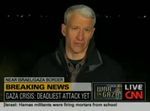 Discussion looking back at the Gaza war's media coverage must address head-on the thorny issue of Israeli press restrictions.
Discussion looking back at the Gaza war's media coverage must address head-on the thorny issue of Israeli press restrictions.
The roots of the policy go back to the 2006 war in Lebanon, when Hezbollah manipulated the press as a weapon against Israel. We saw staged photo ops, accusations that Israel spared Hezbollah rockets for P.R. purposes allegations of uranium shells, and of course, Reuters' own Adnan Hajj, the poster boy for Mideast "fauxtography."
Dispatches from Lebanon mostly failed to acknowledge Hezbollah's media restrictions, further distorting reports and violating media ethics.
Fast-forward to December, 2008. As rocket and mortar fire from Gaza escalated and Israel launched Operation Cast Lead, it's hardly surprising that the IDF barred journalists from entering the strip after learning hard lessons in Lebanon.
The two most common arguments raised for press restrictions in fact have more compelling counter-arguments:
• It's condescending to tell war correspondents that restrictions are for their safety.
• To claim journalists would get in the way of soldiers may certainly apply to specific military operations, but it's not the basis for a democratic state's blanket policy.
It must be noted that the restrictions could not — and did not — lead to an absolute blackout of coverage; plenty of Palestinian journalists were operating in Gaza when the war began. Al-Jazeera still maintained a bureau and took the unusual step of making its content freely available, leading to an astonishing 600 percent increase in web traffic. Other papers relied on stringers. Italian journalist Lorenzo Cremonesi simply entered Gaza from Egypt.
And what was the state of the press in Gaza? As CNN's Anderson Cooper said on Jan. 6:
"Inside Gaza press control by Hamas is heavy-handed. There are few press freedoms inside Gaza, and Hamas controls who reports from there and where they can go."
Heavy-handed indeed. Despite Israel's press curbs:
-
Hamas managed to engineer a "made for the media massacre" where Israel was blamed for shelling a UN school. (HonestReporting predicted this the day before.)
-
People like Mads Gilbert and Eric Margolis gave traction to unfounded claims of massacres and "disproportionate force."
-
The very statistics remain were a subject of dispute — Simona Weinglass found that divergent definition of "civilians" used by the IDF and Palestinian groups mind boggling.
Press curbs didn't cripple Palestinian spin games, laying the groundwork for stories demonizing Israel throughout the year. So what kind of coverage would we have seen in the absence of any media limits?
Credit NY Times bureau chief Ethan Bronner for putting it succinctly. Bronner wrote:
But no matter what, Israel’s diplomats know that if journalists are given a choice between covering death and covering context, death wins. So in a war that they consider necessary but poorly understood, they have decided to keep the news media far away from the death.
In the final analysis of 2009, many in the press weren't simply "neutral observers." Both in cases where the MSM was used and in cases where the the MSM itself sought to influence events, big media became "participants." If this is a dynamic of asymmetric warfare, we have to ask if press coverage is now "warfare by other means."



